The Problems With Rey Random: A Storytelling Analysis
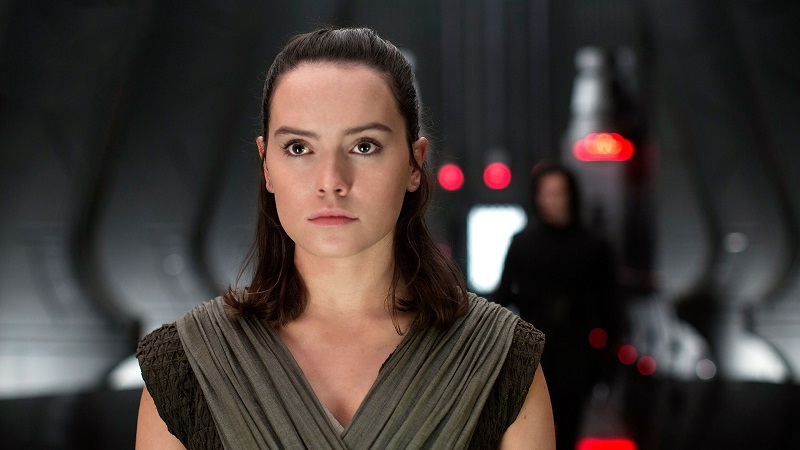 In the months leading up to the release of The Last Jedi, Star Wars fans wondered whether the film would deliver a clear answer to one of the questions lingering after The Force Awakens: who is Rey, and what implications, if any, does her parentage have on her story? Episode VIII indeed addressed the matter, and seemingly settled her heritage as Rey Random. Many fans cheered this reveal, for a variety of reasons, and it is undeniable that Rey remains a favorite Star Wars character with great story potential ahead in Episode IX.
In the months leading up to the release of The Last Jedi, Star Wars fans wondered whether the film would deliver a clear answer to one of the questions lingering after The Force Awakens: who is Rey, and what implications, if any, does her parentage have on her story? Episode VIII indeed addressed the matter, and seemingly settled her heritage as Rey Random. Many fans cheered this reveal, for a variety of reasons, and it is undeniable that Rey remains a favorite Star Wars character with great story potential ahead in Episode IX.
Yet no story – and particularly not a sequel – ever contains only one possible path. For Rey, as the rising Jedi hero of the Sequel Trilogy in the episodic Skywalker saga, fans naturally also considered the possibility that her character might be part and parcel of that family drama story rather than only a participant in it. In the two years between films, they analyzed the clues contained in The Force Awakens and speculated on how they might pay off, or not, in The Last Jedi.
During that same span, fans also learned more about the creative process within Lucasfilm. Certain fundamental characterization sequences in The Force Awakens took shape under the hand of J.J. Abrams in reshoots – including the “Force-back” vision scrutinized in minute detail for clues about Rey’s backstory, with one key moment filmed on the rooftop of Bad Robot in Santa Monica late in post-production. For The Last Jedi, Rian Johnson had been entrusted with the freedom to write Episode VIII, unbound by precommitments for the Sequel Trilogy story from the writers of The Force Awakens or Lucasfilm’s Story Group. Gareth Edwards’ Rogue One underwent even more extensive last-minute reshoots, earning Tony Gilroy a multi-million-dollar fee and co-screenwriter credit, and Lucasfilm replaced four other directors on three additional movies in production. Although several top executives at Lucasfilm are women, of the 9 directors and 14 individuals with story or screenplay credit officially involved in Star Wars films under Kathleen Kennedy, every single one has been a middle-aged white man. The book The Art of The Last Jedi confirmed that all of the other principals on the creative team charged with crafting the second movie of Rey’s story – including production designers and artists and visual designers – were men. For a franchise with a decades-long track record in failing to do right by its female characters, which FANgirl has documented extensively, speculation became joined with apprehension: with no women in the room to advocate for Rey, would Lucasfilm tell the story she deserved?
The secrets of The Last Jedi now have been unveiled to fans, and its storytelling decisions for Rey can be measured against two metrics: the goals of The Last Jedi on the creators’ own terms, and the themes of the Star Wars franchise as a whole. On both criteria, the choice to tell the story of Rey Random lacks the power and impact of the character as Rey Solo instead.
Rian Johnson’s Storytelling Goal for the Characters
When talking about his creative process for writing The Last Jedi, writer-director Rian Johnson has given a consistent description of his goal and how he started toward it. After reading the script for The Force Awakens and otherwise getting up to speed on how world-building and characters arcs in Episode VII, which would serve as the basis for picking them up and moving them forward in Episode VIII, Johnson began by writing down a list of characters and then identifying the biggest challenge each of them could face in the next movie.
“Figure out what’s the most difficult thing each of them could be challenged with now — let’s throw that at them and dig into what really makes them tick by seeing how they handle that.” ~ USA Today (January 2017)
“What’s the hardest thing that Rey could hear? That’s what you’re after with challenging your characters.” ~ Entertainment Weekly
“The fact that I had the freedom to figure it out meant that for this story I could figure out the most dramatically potent answer to that question.” ~ Slashfilm
The most prominent motivation of Rey’s characterization in The Force Awakens is her desire to be reunited with her family. In the first few minutes of screentime when we meet her, we realize this has been her motivation for years: Rey is making a hashmark on the wall of her AT-AT home for each day she has waited for her family to return. For much of The Force Awakens, this motivation defines her character: she explains to BB-8 her familiarity with waiting; she tells Finn she needs to go back to Jakku after delivering the droid to the Resistance; she turns down Han Solo’s job offer because she’s already been away too long; by fleeing into the Takodana woods, she rejects Maz Kanata’s insight about looking forward to her newly discovered connection to the Force and not backward to the family who’s never coming back; when reading her mind at Starkiller Base, Kylo Ren senses her deep loneliness. While the movie ends with a symbolic clothing change and Rey having found belonging, including with Finn and Leia, on its own terms The Force Awakens does not show Rey conclusively breaking with her past and choosing to move forward no longer concerned about her parents.
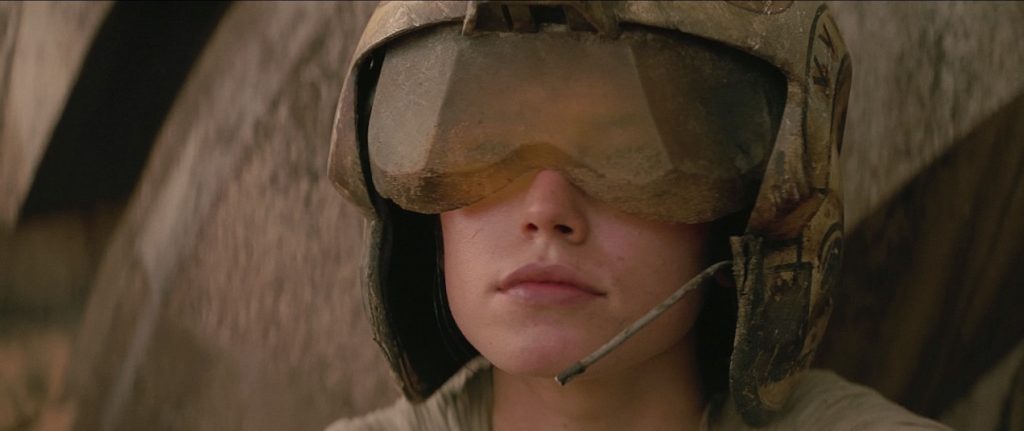
Nevertheless, the ending of Episode VII also presented the opportunity to drop the storyline about Rey’s parents from her character arc. Johnson easily could have based Rey’s story in Episode VIII on the interpretation that her discovery of her new Resistance found family at the end of The Force Awakens demonstrated that she had accepted Maz’s wisdom about letting go of her attachment to her Jakku family just as she had accepted Maz’s insight about closing her eyes to find the Force within herself. To make this interpretation work, Johnson would have needed to identify a most difficult challenge for Rey related to her future, not her past. For example, Rey travels to Ahch-To seeking Force guidance and Jedi training from Luke Skywalker – and it is a very difficult thing for her to hear, as The Last Jedi shows, that Luke refuses to train her and believes that the Jedi Order should end. Other alternatives were available, too, if Johnson had wanted to move on from telling a story with Rey motivated by her heritage.
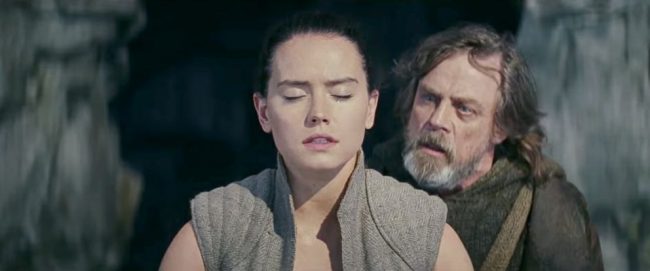 Johnson chose, however, not to discard Rey’s motivation for answers about her family. In fact, The Last Jedi constructs her character arc so that her attachment to her family is the principal temptation posed for Rey by the dark side of the Force. When Luke first teaches Rey meditation to feel the Force, she senses that the dark cave beneath the island holds answers she seeks; Luke immediately reaffirms that it offered her something she wanted and she didn’t even try to stop herself. After learning that Luke had not told her the whole truth about the night Ben Solo destroyed the training temple, Rey chooses to visit the cave in person despite knowing it is dark and dangerous both literally and spiritually. In the Mirror Cave, she does not ask for help finding a teacher, or for answers about her future; she simply pleads to see her parents. She then specifically tells Kylo that she did not receive the answer she had wanted, and that she has never felt more alone. That loneliness creates the emotional vulnerability which Kylo exploits, leading Rey to believe the conflict within him is sufficient to risk leaving the island to join him on the Supremacy. After Snoke’s demise, Kylo then mimics the emotional manipulation tactics of his former master, using Rey’s fears about her parents – that they were nobodies, filthy junk traders who sold her off for drinking money – to try to convince her that her life will have no meaning or significance unless she joins him and gains importance by association.
Johnson chose, however, not to discard Rey’s motivation for answers about her family. In fact, The Last Jedi constructs her character arc so that her attachment to her family is the principal temptation posed for Rey by the dark side of the Force. When Luke first teaches Rey meditation to feel the Force, she senses that the dark cave beneath the island holds answers she seeks; Luke immediately reaffirms that it offered her something she wanted and she didn’t even try to stop herself. After learning that Luke had not told her the whole truth about the night Ben Solo destroyed the training temple, Rey chooses to visit the cave in person despite knowing it is dark and dangerous both literally and spiritually. In the Mirror Cave, she does not ask for help finding a teacher, or for answers about her future; she simply pleads to see her parents. She then specifically tells Kylo that she did not receive the answer she had wanted, and that she has never felt more alone. That loneliness creates the emotional vulnerability which Kylo exploits, leading Rey to believe the conflict within him is sufficient to risk leaving the island to join him on the Supremacy. After Snoke’s demise, Kylo then mimics the emotional manipulation tactics of his former master, using Rey’s fears about her parents – that they were nobodies, filthy junk traders who sold her off for drinking money – to try to convince her that her life will have no meaning or significance unless she joins him and gains importance by association.
Thus, The Last Jedi doubles down on The Force Awakens by defining Rey’s character arc and motivations in large part in terms of her family. If that was the choice Johnson made, then the most difficult challenge Rey should have faced was not the reveal that she is Rey Random, but something else entirely.
The Stronger Payoff: The Family Curse
In The Force Awakens, Rey has an optimistic attitude about reunion with her family. She anticipates it eagerly. She has positive expectations; she smiles at BB-8 when she says, “They’ll be back. Someday.” Nothing in her characterization in Episode VII suggests that Rey has any idea that the bonds of family could be a curse rather than a blessing.
Viewed in that light, the most difficult challenge she could face is learning that her family places terrible burdens and challenges upon her. If Rey learned she was a Solo, the consequences for her character would be profound. Her grandfather was, in her own words, “the most hated man in the galaxy” – an evil overlord who killed her grandmother, wiped out the old Jedi Order, and who helped the tyrannical Empire rule the galaxy with an iron fist for two decades. Her uncle is a self-proclaimed failure as a Jedi Master. Her parents were estranged, her father a washed-up failure as a smuggler before his death and her mother the leader of a Resistance that failed to prevent the First Order from destroying the New Republic. Her brother aspires to be a new Vader: falling to the dark side, killing the new generation of Jedi, and helping preside over a resurgent evil regime with ambitions of galactic domination. This is not a family anyone would want to find out they are a part of.
It is one thing for Rey to watch a monstrous stranger kill the avuncular old man who was briefly her friend and possibly prospective mentor – it’s another thing for Rey to realize she had watched her brother murder their father.
In addition, the revelation would profoundly affect Rey’s ongoing story, too. How would Finn or Poe or Rose view her, knowing her bloodline includes Darth Vader and Kylo Ren? Could anyone trust her? Could she trust herself? Learning she is Rey Solo would cast a long shadow of family tragedy over not only Rey’s past, but also her future.
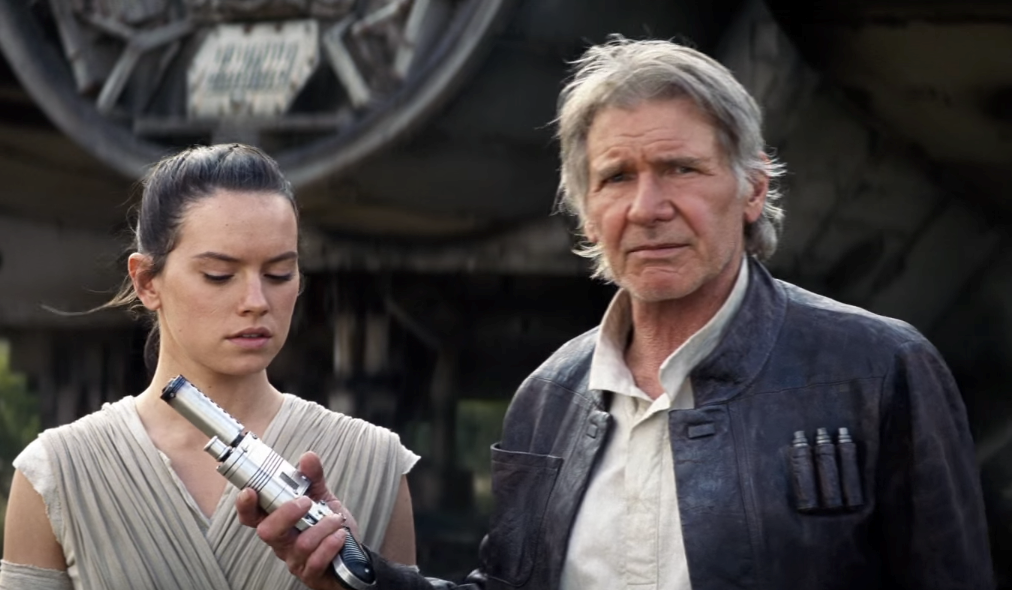 The thematic power for the audience, too, would be incredibly impactful, and incredibly relatable, if Rey learned that her family heritage is not something positive in her life, but a curse upon her. Family becomes not a source of strength, but something she has to overcome. It becomes not a source of pride or inspiration, but something that looms over her, in her own mind and in the eyes of others. In real life, many people have troubled family pasts or difficult family relationships. Some of these are inherited, such as genetic predispositions to mental illness or substance abuse. Others are environmental, such as intra-family violence or being raised among values of hatred or bigotry. The effects of these dynamics, whether nature or nurture, shape individuals’ lives in dramatic, sometimes irreversible, ways. Will the cycle be broken, or will it continue? Will family tragedy damage another generation, or will it be overcome? To see Rey Solo have to confront these questions, to wonder whether she can successfully become an aspirational heroic figure to inspire strength and courage in members of the real-world audience, would have made family the most difficult challenge she could have faced.
The thematic power for the audience, too, would be incredibly impactful, and incredibly relatable, if Rey learned that her family heritage is not something positive in her life, but a curse upon her. Family becomes not a source of strength, but something she has to overcome. It becomes not a source of pride or inspiration, but something that looms over her, in her own mind and in the eyes of others. In real life, many people have troubled family pasts or difficult family relationships. Some of these are inherited, such as genetic predispositions to mental illness or substance abuse. Others are environmental, such as intra-family violence or being raised among values of hatred or bigotry. The effects of these dynamics, whether nature or nurture, shape individuals’ lives in dramatic, sometimes irreversible, ways. Will the cycle be broken, or will it continue? Will family tragedy damage another generation, or will it be overcome? To see Rey Solo have to confront these questions, to wonder whether she can successfully become an aspirational heroic figure to inspire strength and courage in members of the real-world audience, would have made family the most difficult challenge she could have faced.
Instead, Rey learns that her family will have no further impact on her life. Her lineage is meaningless. Her choices are her own. Learning she is Rey Random means that she faces no consequences, no ramifications, and no burdens from her family heritage. She is free to simply live her life, with no long shadows to overcome and no dangerous risks to guard against. With Lucasfilm having consistently pushed the talking point that Episodes VII and VIII are about family, and Rey’s own motivations in those two movies centering in large part on her unrequited expectations and unanswered questions about her family, Rey ends up with that theme playing no part in her story going forward.
“You’re the same as me. You’re trapped. You’ll never break the cycle. Accept it.”
vs.
“You’re nobody. If you want your life to have meaning, join me.”
The Weaker Pivot: A Nobody’s Self-Reliance
Rather than make the truth about Rey’s family the core of her most difficult challenge, the seed of doubt and fear about her own motivations and her construction of her own identity, The Last Jedi abruptly pivots to redefine the question that troubles Rey’s sense of self. Instead of seeking answers about her past and her heritage, Rey questions whether she is worthy of a role as a hero in the latest conflict ripping through the galaxy.
“The easiest thing for Rey and the audience to hear is, Oh yeah, you’re so-and-so’s daughter. That would be wish fulfillment and instantly hand her a place in this story on a silver platter. … The hardest thing for her is to hear she’s not going to get that easy answer. Not only that, but Kylo is going to use the fact that you don’t get that answer to try and weaken you so you have to lean on him. You’re going to have to find the strength to stand on your own two feet and define yourself in this story.” ~ Entertainment Weekly
“Wish fulfillment. It’s like, ‘Oh, great! That’s who I am. That’s that.’” ~ CinemaBlend
“The hardest thing for all of us to hear and the thing that she doesn’t wanna hear and maybe we don’t either is that no, this is not going to be something where it’s going define you.” ~ Slashfilm
It certainly seems odd to refer to Solo/Skywalker heritage as “wish fulfillment” when, as explained above, membership in that family tree is hardly something to celebrate as having a positive impact on one’s life. Johnson, though, has something different in mind.
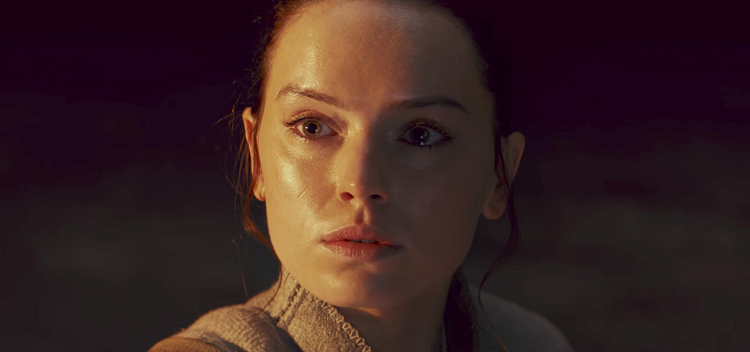 Rey verbalizes this newfound identity crisis in the first Jedi temple after Luke has explained his failure as a master and legend: she tells him, “I need someone to show me my place in all this.” Following their fight in the rain, she extends the lightsaber to Luke a second time, urging him to take up the sword and bring the legendary Jedi back to the galaxy; when he refuses, she tells him that Ben Solo turning back to the light side is “our last hope.” The implication, then, is that Rey does not believe herself worthy of the role of hero in her own right.
Rey verbalizes this newfound identity crisis in the first Jedi temple after Luke has explained his failure as a master and legend: she tells him, “I need someone to show me my place in all this.” Following their fight in the rain, she extends the lightsaber to Luke a second time, urging him to take up the sword and bring the legendary Jedi back to the galaxy; when he refuses, she tells him that Ben Solo turning back to the light side is “our last hope.” The implication, then, is that Rey does not believe herself worthy of the role of hero in her own right.
The storytelling problem with this pivot is that Rey’s self-doubt about whether she can be a hero has no support elsewhere in The Force Awakens or The Last Jedi. It is not consistent with the previous portrayal of Rey’s background and characterization. Nor does it line up with Rey’s own experiences of the conflict in the galaxy, or with the myths and history of the galaxy that Rey is shown to know about.
Nothing in The Force Awakens provides any reason for believing that Rey harbors any doubt in her commitment to doing the right thing. She saves BB-8 from Teedo not with any expectation of reward, but simply because she should. When she learns BB-8 carries information vital to the Resistance, she immediately pledges to help him get back to their base – even though it means temporarily leaving Jakku and her vigil for her family. She readily agrees to un-fix her repair to the Falcon to poison anticipated First Order stormtroopers. She saves Finn from the rathtars. She listens, wide-eyed, as Maz explains the longstanding need for the light to oppose the dark in the galaxy, this time in the form of the First Order. She insists to Finn that he can’t abandon the mission to return BB-8 to the Resistance. The only time Rey hesitates is when Maz explains to her about the lightsaber and the Force, when Rey wants “no part of this” and runs out into the Takodana forest. When the First Order invasion arrives minutes later, though, Rey immediately rushes back to help her friends, blasting stormtroopers before being captured by Kylo Ren. After she frees herself from captivity, she unlocks the blast doors so Han and Chewie can plant the detonators in the oscillator. In the snowy woods of Starkiller Base, she takes up a weapon she has never wielded before to duel Kylo. And she leaves her new friends to travel to find Luke Skywalker, because that is what Leia and the Resistance need her to do.
Likewise, Rey has no reason to think that a connection to an important family bloodline is necessary for heroism in the conflict against the First Order. BB-8 belongs to Poe Dameron, trusted by Leia but not related to her. Finn is a defector who never knew his family. Maz is a centuries-old figure of wisdom who makes no reference to lineage when explaining that the First Order must be opposed. To Rey, Han Solo is famous as a smuggler more than a Rebellion general. Rey also knows myths about the Jedi – and not only Luke Skywalker, but also the Force and the Order more broadly, which Han validates in the Falcon while looking at the map. Among the legends of the Jedi – the same ones the audience has seen in previous Star Wars films and television, after all – only Luke and Darth Vader share a bloodline. Obi-Wan Kenobi, Yoda, Qui-Gon Jinn, Mace Windu, Ahsoka Tano… None of these larger-than-life icons of Jedi lore has their heroism defined by who they are related to, rather than simply by their mastery of the Force and commitment to the good side.
Yet after Snoke’s demise in The Last Jedi, Kylo pushes Rey on this newfound self-doubt. At his insistence, she acknowledges that her parents were nobodies. He then declares that she is “nothing” and has “no place in this story” unless she joins him.
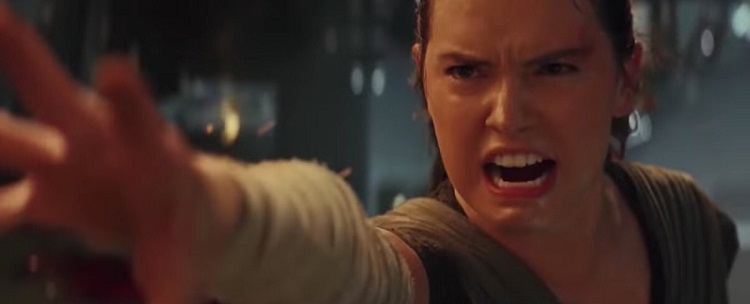 Rey, of course, rejects that claim. She refuses to take Kylo’s hand, instead reaching for the lightsaber. She flees the damaged Supremacy and brings the Falcon to assist the defense of the Resistance on Crait. Ultimately she lifts the rocks to rescue the survivors from the mine tunnels, proving herself to be, as Luke anoints her, the last Jedi.
Rey, of course, rejects that claim. She refuses to take Kylo’s hand, instead reaching for the lightsaber. She flees the damaged Supremacy and brings the Falcon to assist the defense of the Resistance on Crait. Ultimately she lifts the rocks to rescue the survivors from the mine tunnels, proving herself to be, as Luke anoints her, the last Jedi.
One interpretation of this turn of events is that Rey has realized she is her own person, free to make her own choices and deal with her own successes and failures. The storytelling problem with this view, though, is that it denies Rey any agency in learning that lesson. Her family is nobodies, her parents are dead. It is simply that circumstances define Rey as her own person. She has no decision to make; her role as an autonomous actor is decided for her.
On the other hand, if her arc had fulfilled its full potential by revealing her to be Rey Solo, then this same moment in her character development would have been much more powerful. With all the burdens of that particular family lineage upon her, Rey would be empowered to choose to be her own person. Despite the pull that family exerts on her, despite the failures and darkness among her kin, Rey asserts her own will and decides to be better. The moral to that story is relatable for the audience, as well. Many individuals in the real world face difficult choices throughout their lives in balancing the conflicting push and pull of family and of their own individuality.
Over the course of history, women have been denied the ability to shape their own lives. If they were even permitted to obtain an education, or to work outside the home at all, they could not choose any career path as men could. They were traded or gifted to husbands selected by others, and their surnames were changed to reflect the legal and practical reality that their husbands owned and controlled them. Yet through two movies the Sequel Trilogy’s female hero has not been allowed to even have a surname, nor given autonomy in defining her life’s story. If she is Rey Random, a surname would grant her full ownership of her identity. To see Rey Solo – or perhaps, Rey Organa – triumph by choosing her own path, despite her roots, would have provided an affirming and validating message.
The Force Awakens established Rey as a self-reliant young woman yearning for reunion with her family. When she learns in The Last Jedi that she is Rey Random, rejecting Kylo’s offer and choosing to remain self-reliant is no great emotional challenge for her. If she had learned she is Rey Solo, however, the emotional turmoil and its stakes would have been much greater.
Rey’s Journey is a Skywalker Story
In discussions of the Rey Random reveal in The Last Jedi, some have suggested that its thematic message is that Rey can be the hero of her own story, rather than defining her story as simply another iteration of an ongoing family drama. Perhaps this is how the creative team at Lucasfilm sees Rey Random’s role in the Skywalker saga, as well.
The storytelling problem with this viewpoint is that Rey’s journey is defined entirely in conjunction with the Skywalker saga and its familial characters. At no point in Episode VII or Episode VIII does Rey undertake a character arc of her own, one not driven by its relationship with or opposition to one or more of the Skywalkers.
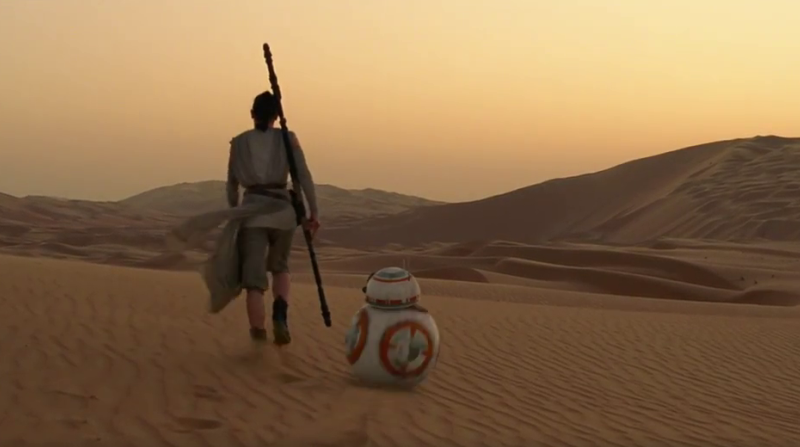 In The Force Awakens, Rey’s path to heroism begins because of Leia, who sent Poe to Jakku to retrieve the map to Luke from Lor San Tekka. The events in the village result in Rey meeting BB-8, the Call to Adventure of her hero’s journey. Keeping BB-8 at her side leads Rey to Finn, then to fleeing the First Order in the market and in the Falcon, and finally to leaving Jakku despite her desire to wait for her family’s return. The Falcon brings Rey straight to Leia’s husband, Han, who validates that the Force and the Jedi are real before bringing Rey to Maz to help get BB-8 back to the Resistance. On Takodana the Force draws Rey to Luke’s lightsaber, and then she is caught in the clutches of the fourth Skywalker, Kylo Ren. She is held captive and interrogated by him; in the process, he inadvertently teaches her how use the Force to perform a mind trick and to duel with a lightsaber. After defeating Kylo in combat, Rey meets in Leia person at the Resistance base and receives the iconic blessing “May the Force be with you” from her. The movie ends with Rey approaching Luke, offering his old lightsaber to him.
In The Force Awakens, Rey’s path to heroism begins because of Leia, who sent Poe to Jakku to retrieve the map to Luke from Lor San Tekka. The events in the village result in Rey meeting BB-8, the Call to Adventure of her hero’s journey. Keeping BB-8 at her side leads Rey to Finn, then to fleeing the First Order in the market and in the Falcon, and finally to leaving Jakku despite her desire to wait for her family’s return. The Falcon brings Rey straight to Leia’s husband, Han, who validates that the Force and the Jedi are real before bringing Rey to Maz to help get BB-8 back to the Resistance. On Takodana the Force draws Rey to Luke’s lightsaber, and then she is caught in the clutches of the fourth Skywalker, Kylo Ren. She is held captive and interrogated by him; in the process, he inadvertently teaches her how use the Force to perform a mind trick and to duel with a lightsaber. After defeating Kylo in combat, Rey meets in Leia person at the Resistance base and receives the iconic blessing “May the Force be with you” from her. The movie ends with Rey approaching Luke, offering his old lightsaber to him.
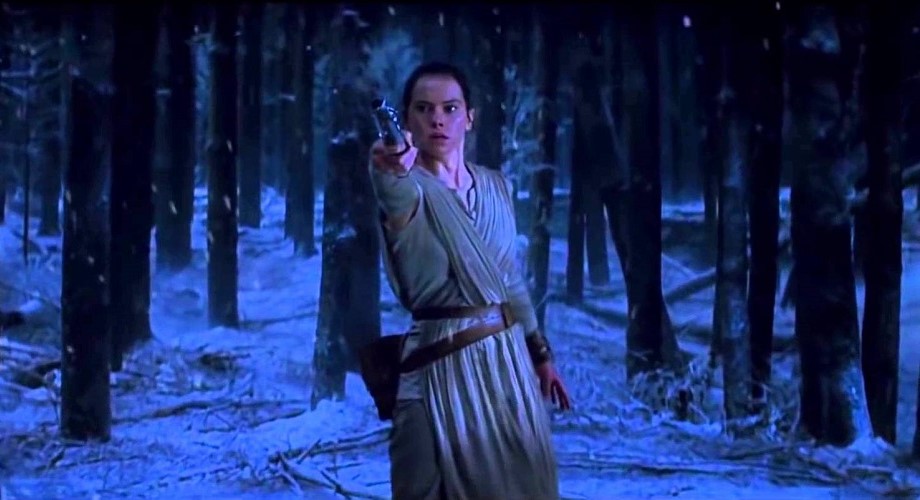 In The Last Jedi, Rey’s entire character arc is juxtaposed against two Skywalkers, Luke and Kylo. This was no accident: in the Art of The Last Jedi book (page 111), Rian Johnson specifically describes her storyline as a “triangle” among those three characters. The film’s story bears out this idea. Everything about Rey’s interactions with Luke originates from the Skywalker saga: Luke tosses away the lightsaber because of his past failures with himself and with Kylo; Luke believes the Jedi need to end because of the Order’s broader failings, as well as his own; Luke severs the fourth Force conversation between Rey and Kylo because of his antagonism toward his former pupil; Luke’s second refusal of the proffered lightsaber comes because he has not (yet) changed his mind. Rey’s decision to leave the island is motivated by her belief that she can reach the good still inside Kylo. Rey’s moment of heroic Jedi choice occurs in opposition to Kylo, rejecting his offer to join him on the dark side. Upon making that choice, Rey returns to Leia, following the beacon to rescue the Resistance survivors.
In The Last Jedi, Rey’s entire character arc is juxtaposed against two Skywalkers, Luke and Kylo. This was no accident: in the Art of The Last Jedi book (page 111), Rian Johnson specifically describes her storyline as a “triangle” among those three characters. The film’s story bears out this idea. Everything about Rey’s interactions with Luke originates from the Skywalker saga: Luke tosses away the lightsaber because of his past failures with himself and with Kylo; Luke believes the Jedi need to end because of the Order’s broader failings, as well as his own; Luke severs the fourth Force conversation between Rey and Kylo because of his antagonism toward his former pupil; Luke’s second refusal of the proffered lightsaber comes because he has not (yet) changed his mind. Rey’s decision to leave the island is motivated by her belief that she can reach the good still inside Kylo. Rey’s moment of heroic Jedi choice occurs in opposition to Kylo, rejecting his offer to join him on the dark side. Upon making that choice, Rey returns to Leia, following the beacon to rescue the Resistance survivors.
This is not to say that Rey’s role in the story is unimportant, only that it is not her story.
Perhaps the closest comparison in Star Wars is Obi-Wan Kenobi. In the Prequel Trilogy, Obi-Wan is the third character in the story’s Big Three, together with the forebears of the Skywalker bloodline, Anakin and Padmé. The Phantom Menace is Padmé’s story, following the hero’s journey of Queen Amidala from the occupation of her planet to her trials on Tatooine and Coruscant to the liberation of Naboo. Attack of the Clones and Revenge of the Sith are Anakin’s tragedy, as his progressively worse decisions culminate in his fall to the dark side to become Darth Vader. Throughout the three films, Obi-Wan is the consistent Jedi hero, standing firm in the light and doing his best to serve the cause of peace and justice in the Republic. In the Original Trilogy, Obi-Wan is the mentor. He guides Luke’s path to becoming a Jedi Knight, beginning the process of restoring to the galaxy what Vader helped destroy.
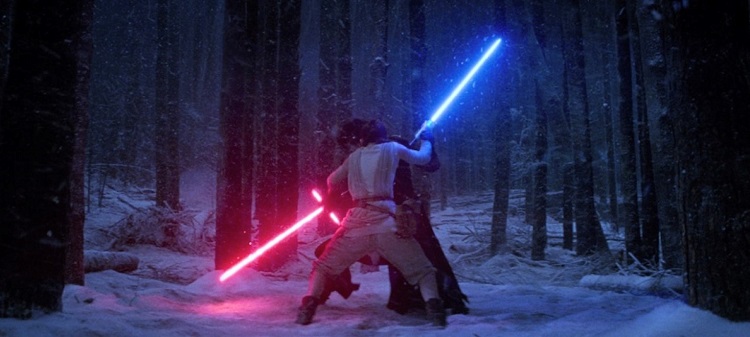 Rey’s story in The Force Awakens and The Last Jedi mirrors Kenobi’s in prominent ways. In her role as a contrast to Kylo, Rey functions as the stolid and reliable Jedi hero, while he serves as the volatile and malicious villain. In her role as an apprentice to Luke, absconding with the sacred Jedi texts and literally picking up the pieces of his lightsaber, Rey is poised to begin rebuilding the Jedi Order a second time after another Skywalker tragedy destroyed it again.
Rey’s story in The Force Awakens and The Last Jedi mirrors Kenobi’s in prominent ways. In her role as a contrast to Kylo, Rey functions as the stolid and reliable Jedi hero, while he serves as the volatile and malicious villain. In her role as an apprentice to Luke, absconding with the sacred Jedi texts and literally picking up the pieces of his lightsaber, Rey is poised to begin rebuilding the Jedi Order a second time after another Skywalker tragedy destroyed it again.
Through two movies in the Sequel Trilogy, Rey is not the hero of her own story. Her tale is not independent. Instead, she is a Random interloper in the Skywalker family soap opera. If the Skywalkers are going to define her character arc, then Rey is part of their story. While there is no shame in Kenobi’s heroic role, if she is part of their story anyway, her arc would have been even more powerful as Rey Solo.
The Lost Opportunity for a Dynastic Heroine
Another point frequently raised in discussions of the Rey Random reveal in The Last Jedi is that her background as a “nobody” validates the thematic message that anyone can be a hero, that having a special bloodline or famous parents is not necessary to become a Jedi. Again, perhaps this is how the Lucasfilm creative team views the purpose of Rey Random’s “no one” heritage in the story, as well.
The storytelling problem with this notion is two-fold. First, the theme is already firmly established in Star Wars and was not in need of reinforcement from Rey’s story arc. Second, the decision to put Rey’s story within the Skywalker saga, but deny her a familial role in its conflicts, deprived the Star Wars franchise of the opportunity to tell a compelling tale about a young woman rising to become the best of what her family has to offer.
Star Wars has no shortage of examples of the “everyman becomes a hero” trope. In Rogue One, Jyn and Cassian are ordinary people who rise to the occasion to become heroes. In Star Wars Rebels, Ezra Bridger is a street rat and child of two regular citizens who becomes a Jedi. In the Prequels, Padmé is an ordinary girl who was elected queen rather than inheriting it, while Anakin is a slave. In the Original Trilogy, only Leia is a princess; Luke is farmboy before he learns of his heritage, while Han and Lando are (somewhat) reformed smugglers and gamblers. Even within the Sequel Trilogy itself, the other heroic leads – Finn, Poe, and Rose – come from nondescript backgrounds. The trope would hardly be in danger of falling into disuse if Rey had been allowed a Solo heritage.
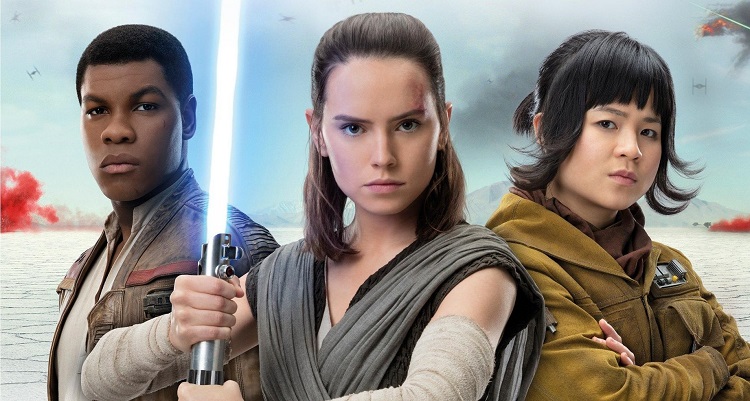 Moreover, the Star Wars franchise as a whole makes eminently clear that the vast majority of Jedi heroes are not the product of a parental bloodline with strength in the Force. Neither Kanan nor Ezra in Rebels inherited their Jedi traits. Among all the Jedi seen onscreen in the Prequel Trilogy and The Clone Wars, the implication of inherited power in the Force is virtually non-existent. Obi-Wan Kenobi, arguably the greatest Jedi of that era, was found as a child among ordinary parents and brought to the temple on Coruscant to be trained – and both The Clone Wars and Star Wars Rebels have included stories specifically told to show this dynamic: the Jedi and the Sith understood that children would be randomly born with Force strength throughout the galaxy, and these children could be located and trained to reach the full potential of their gifts. In the aggregate, Star Wars lore is quite clear that strength in the Force inherited from a bloodline is the exception, not the usual case. None of that would be diminished if the Jedi hero of the Sequel Trilogy were Rey Solo rather than Rey Random.
Moreover, the Star Wars franchise as a whole makes eminently clear that the vast majority of Jedi heroes are not the product of a parental bloodline with strength in the Force. Neither Kanan nor Ezra in Rebels inherited their Jedi traits. Among all the Jedi seen onscreen in the Prequel Trilogy and The Clone Wars, the implication of inherited power in the Force is virtually non-existent. Obi-Wan Kenobi, arguably the greatest Jedi of that era, was found as a child among ordinary parents and brought to the temple on Coruscant to be trained – and both The Clone Wars and Star Wars Rebels have included stories specifically told to show this dynamic: the Jedi and the Sith understood that children would be randomly born with Force strength throughout the galaxy, and these children could be located and trained to reach the full potential of their gifts. In the aggregate, Star Wars lore is quite clear that strength in the Force inherited from a bloodline is the exception, not the usual case. None of that would be diminished if the Jedi hero of the Sequel Trilogy were Rey Solo rather than Rey Random.
And there can be no doubt that since its inception, the Sequel Trilogy has been conceived of, and marketed as, the third trilogy of the Skywalker family saga.
“Kennedy and Disney plan a slate of new Star Wars feature films, beginning with the long-awaited Star Wars: Episode VII, targeted for release in 2015, followed by Episodes VIII and IX.” ~ starwars.com (Oct. 30, 2012)
“It’s a great next chapter in the iconic Skywalker family saga. It will be followed by our Han Solo origin film, which is just going into production.” ~ Disney CEO Bob Iger addressing Episode VIII in remarks to shareholders for Q1 earnings report (Feb. 7, 2017)
“In Lucasfilm’s Star Wars: The Last Jedi, the Skywalker saga continues as the heroes of The Force Awakens join the galactic legends in an epic adventure that unlocks age-old mysteries of the Force and shocking revelations of the past.” ~ starwars.com
“Lucasfilm is excited to announce that Johnson will create a brand-new Star Wars trilogy … In shepherding this new trilogy, which is separate from the episodic Skywalker saga, Johnson will introduce new characters from a corner of the galaxy that Star Wars lore has never before explored.” ~ starwars.com (Nov. 9, 2017)
In fact, the purpose of titling a movie as “Episode VII” or “Episode VIII” rather than as “A Star Wars Story” is to emphasize the distinction between the Skywalker saga and other Star Wars films. The Force Awakens and The Last Jedi are, by definition, further stories in a dynastic family story. Building on what George Lucas established in the Original and Prequel trilogies, having lineage soap opera in the Star Wars space opera is inherently a core conceit of the Sequel Trilogy.
After Episode IX, the Star Wars franchise will have plenty of opportunities to tell more stories in which an everyman becomes a hero, or in which a person born of ordinary parents becomes a Jedi. What the franchise will not have, however, will be the compelling storytelling power – building on six films of groundwork – of showing a young woman pick up the torch of her family’s heritage and carry it forward heroically for the next generation. Particularly in the current social and political climate, where the fight for equality remains far from over, it is difficult to understate the significance of the theme that daughters are as worthy as sons, that women deserve the same consideration and recognition as men.
Recently the Lucasfilm Story Group’s Pablo Hidalgo tweeted the following:
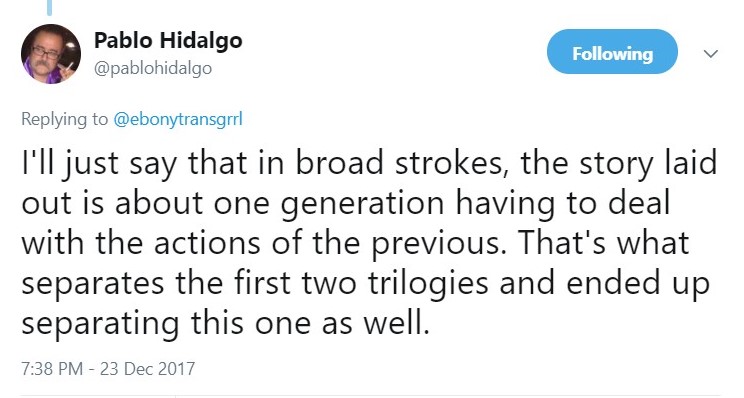 But wouldn’t that inter-generational story have been more powerful if it centered on the hero’s own family’s actions, rather than the actions of strangers? Isn’t the symbolism of the Force tug-of-war on the Supremacy more meaningful if it involves dueling heirs to the Excalibur heirloom, rather than one descendant and one random adversary?
But wouldn’t that inter-generational story have been more powerful if it centered on the hero’s own family’s actions, rather than the actions of strangers? Isn’t the symbolism of the Force tug-of-war on the Supremacy more meaningful if it involves dueling heirs to the Excalibur heirloom, rather than one descendant and one random adversary?
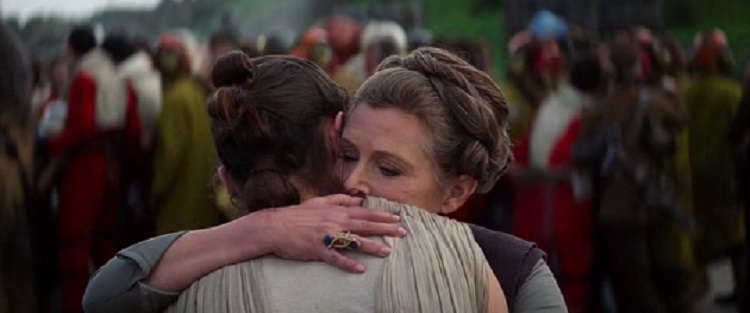 Imagine what it would mean to the audience, as individuals and as a global community, to see an Episode IX that concludes with Leia Organa and Rey Solo rebuilding the Jedi Order and defeating the First Order. To see two women – a mother and her daughter, in a saga with so much storytelling time already devoted to fathers and sons – healing the galaxy from the damage done by their two brothers. That would be the kind of aspirational heroic fiction that Star Wars at its best offers to inspire its audience, but which also constantly is at risk of giving way to “realism” and deconstruction. To see Rey Solo triumphant, and not merely Kylo Ren defeated, is an ending worthy of the Skywalker saga.
Imagine what it would mean to the audience, as individuals and as a global community, to see an Episode IX that concludes with Leia Organa and Rey Solo rebuilding the Jedi Order and defeating the First Order. To see two women – a mother and her daughter, in a saga with so much storytelling time already devoted to fathers and sons – healing the galaxy from the damage done by their two brothers. That would be the kind of aspirational heroic fiction that Star Wars at its best offers to inspire its audience, but which also constantly is at risk of giving way to “realism” and deconstruction. To see Rey Solo triumphant, and not merely Kylo Ren defeated, is an ending worthy of the Skywalker saga.
The Future of Rey Random in Episode IX
Lucasfilm, for its part, has chosen to proceed with a story in which the identity of the Sequel Trilogy’s Jedi heroine is Rey Random. From a storytelling perspective, Episode VIII was the time to make the reveal of Rey Solo if it were going to happen. It made sense not to do so at the end of The Force Awakens when Rey meets Leia, because such a moment would be anticlimactic and detract from the other thematic threads brought together within that film. To unveil Rey Solo’s heritage in The Last Jedi, on the other hand, would have synced thematically not only to her interactions with Luke but also to her climactic showdown with Kylo Ren. Holding such a reveal until Episode IX, and trying to construct a scenario in which it is even more impactful than it would have been in The Last Jedi, would likely come across as contrived, if not break the audience’s suspension of disbelief entirely. Much more likely, Episode IX will continue the story of Rey Random.
At the same time, Episode IX will be the concluding movie of the Sequel Trilogy in the Skywalker saga. No doubt Rey Random is intended to play a prominent role in its story. Nonetheless, the mere fact of that dynamic – she is an adjunct to the family saga rather than a part of it – creates a real danger that Rey’s story will become subservient to Kylo Ren’s. Two years ago FANgirl expressed concerns about this very issue in Rey At Risk: Keeping Lucasfilm Accountable to Her Potential, and The Last Jedi has done little to assuage them – and in some ways has increased them. Likewise, the instability in and composition of the Lucasfilm creative team offers continuing reason for apprehension about Rey Random’s third movie. Fans rightfully lack confidence in a process with a demonstrated pattern of reactively fixing problems on the back end, rather than proactively ensuring quality on the front end.
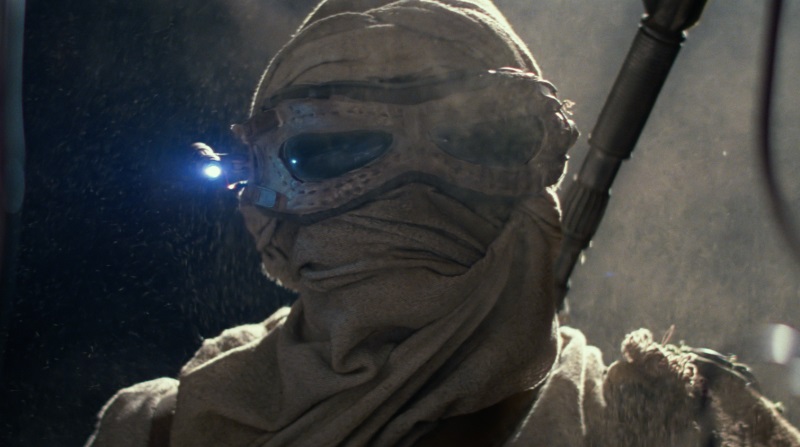
Finally, consider this question: why does this entire essay have to refer to the character as Rey Random?
If the media reports are accurate that J.J. Abrams and Rian Johnson independently reached the determination to tell the story of Rey Random while creating The Force Awakens and The Last Jedi, respectively, what explains ending her second film without providing her with a surname?
Is it because neither man thought it was important enough? Surnames abound in Star Wars storytelling, and no prominent male lead previously has been denied one. (Finn is the rare exception, but his lack of surname was created, marketed, and maintained in tandem with Rey’s while his character developed in a supporting arc alongside hers.)
Is it false secrecy deliberately intended to stoke speculation and discussion? This would not be the first time Abrams has relied on lore nuggets and purported mysteries as headfakes to distract fans from the reality that his serialized storytelling sometimes has been made up on the fly rather than thoughtfully planned.
In the event Rey Random finally gets an actual surname in Episode IX, will it be a well-considered story decision or a single screenwriter’s whim because the clock ran out to pick something?
If the creators’ notion from the start has been to tell the tale of a “no one” heroine, a “nobody” young woman who becomes a Jedi, then her lack of a surname shows a disturbing ignorance of the contemporary dialogue, within Hollywood and in the broader American and global communities, about women, feminism, and identity. What valid reason exists to deny the Sequel Trilogy’s female lead a last name from the start, if not by Episode VII’s conclusion, much less by the end of Episode VIII at the very least? Instead a story intended to give women ownership of their place in the universe of myth denies its female lead the simple dignity of a last name.
And then, hardly two weeks after The Last Jedi’s release, Johnson abruptly hedged on his pattern of statements about Rey’s parentage, instead overtly stating that the identity of Rey and her parents is still an open question for Abrams in writing the screenplay for Episode IX.
Is the reason Rey Random does not yet have a surname because the storytellers have not yet actually decided on her heritage?
And what would that suggest about the level of thoughtfulness and commitment going toward ensuring that Rey is given the best possible story for her trilogy-spanning character arc?
From Return of the Jedi to Revenge of the Sith to numerous examples in the Legends tales and The Clone Wars, Star Wars has a long track record of ending the story arcs of its female characters by undermining, sidelining, debasing, or even fridging them. And like the other Star Wars films of the Disney era, once again no women wield creative power over the fate of Rey and her story. With Episode IX still months from the start of principal photography, it remains as important as ever for fans to continue to speak up on her behalf and hold Lucasfilm accountable for doing right by Rey’s character.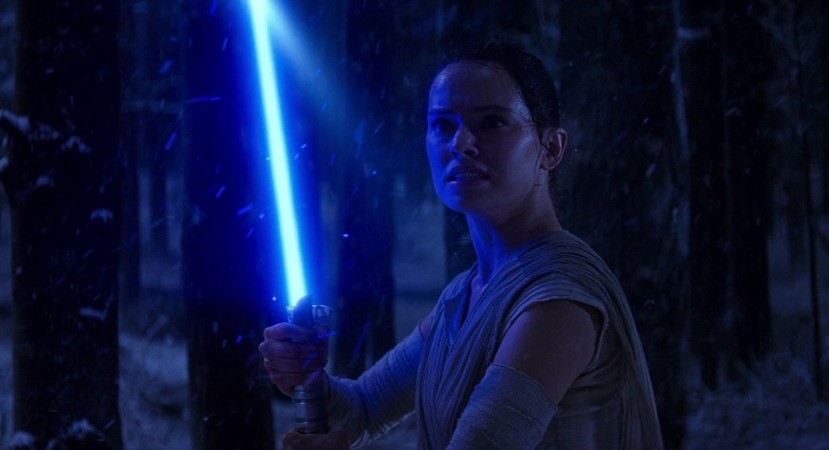

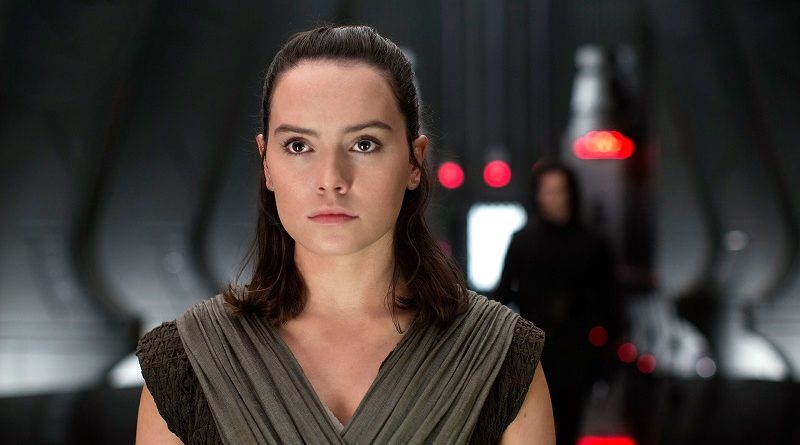







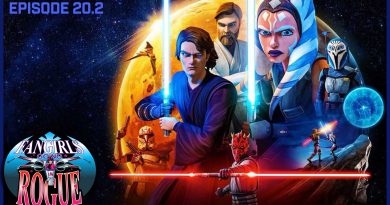

The problem with assuming Rey was a Solo, always was simply Leia being her mom. While a male character might forget, or not realize he got someone pregnant in a one night stand, Leia was never going to forget a child she had carried for 9 months. Even if you end up with some He-Man/Shera style separated at birth plotlines, Leia is going to know a) she had a daughter, and b) that daughter is missing. And Leia being force sensitive would generally precludes her from thinking the child is dead. Which is why when Leia didn’t great Rey in any paticular way in the Force Awakens, or afterward it confirmed Leia wasn’t her mom. Which really from a Skywalker perceptive left Luke as her dad as an option, which was viable until Luke in the Force Awakens had no idea who she was. So really there was the potential for her to be Ben Solo’s cousin, but not his twin.
I don’t disagree that the issues you mention are present in the theatrical versions of TFA and TLJ. The essay is not trying to argue that the character in the movies actually is Rey Solo, but rather that the movies should have told that story instead.
There is a perspective I think you should have considered for this story. And one I encourage you to look into, perhaps to revisit this topic at a later date.
First, you will need to find someone who is either adopted, or orphaned. This may be difficult. You may not know many refugees, and it’s tricky to pick adopted people out of a crowd.
Then, propose to them your thesis that not having a last name is a form of disrespect, removes agency, makes one a “nobody”, and shows a disturbing ignorance of the contemporary dialogue about women, feminism, and identity. (assuming they are female)
They might reply that they saw a different form of representation and sympathized with the idea that Rey’s unknown lineage could simultaneously be the most important thing in the galaxy to _her_, while still being irrelevant to everyone else. They may have other perspectives too.
Great catch. I haven’t seen it that way yet. Thanks.
Wonderful analysis. Thank you.